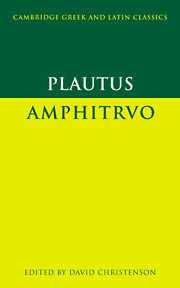Play without end
from Introduction
Published online by Cambridge University Press: 05 March 2013
Summary
Limitations of space allow for only the briefest survey of the remarkable influence Am. has enjoyed in European literature. Regular revivals of it and other perennial Plautine favourites were staged at least into the Augustan Age, whereafter the plays were primarily read. As the empire became Christian, Plautus’ plays met with increasing censure and Terence’s, which could be culled for their moral maxims, garnered increased respect; St Jerome (Ad Eust. 30), however, confessed to a fondness for the more boisterous comedies of the elder playwright. We do not hear of a medieval adaptation of Am. prior to Vital de Blois’ Geta, which no doubt was read rather than performed in the early twelfth century. Here the basic love-triangle of Plautus’ play is preserved, though it is subordinated to new material. Mercury appears under the name Archas, but the main focus is on Geta (= Sosia), a slave who has taken on intellectual airs as the result of accompanying Amphitryon on a philosophical pilgrimage to Greece. Geta is eventually put in his place by more accomplished scholastic debaters.
The Palatine branch of the tradition was at some point split up for ease of copying into two parts consisting of eight (Am., As., Aul., Capt., Cas., Cist., Cur., Epid.) and twelve (Bac., Men., Mer., Mil., Mos., Per., Poen., Ps., Rud., St., Trin., Truc.) plays; the latter group all but perished in the late Middle Ages until their rediscovery by Nicolaus Cusanus in 1429. This exciting find kindled new interest in Plautus, resulting not only in scholarly Latin editions, but in translations and performances as well. In 1487 Pandolfo Collenuccio produced an Italian translation of Am. which was subsequently produced and grandly staged on two separate occasions under the patronage of Duke Ercole I. At the end of this play, Anfitrione confides his displeasure at being a cuckold to the audience. Around this time, someone composed 175 lines of Latin to fill the large lacuna of Am.
- Type
- Chapter
- Information
- Plautus: Amphitruo , pp. 71 - 74Publisher: Cambridge University PressPrint publication year: 2000

